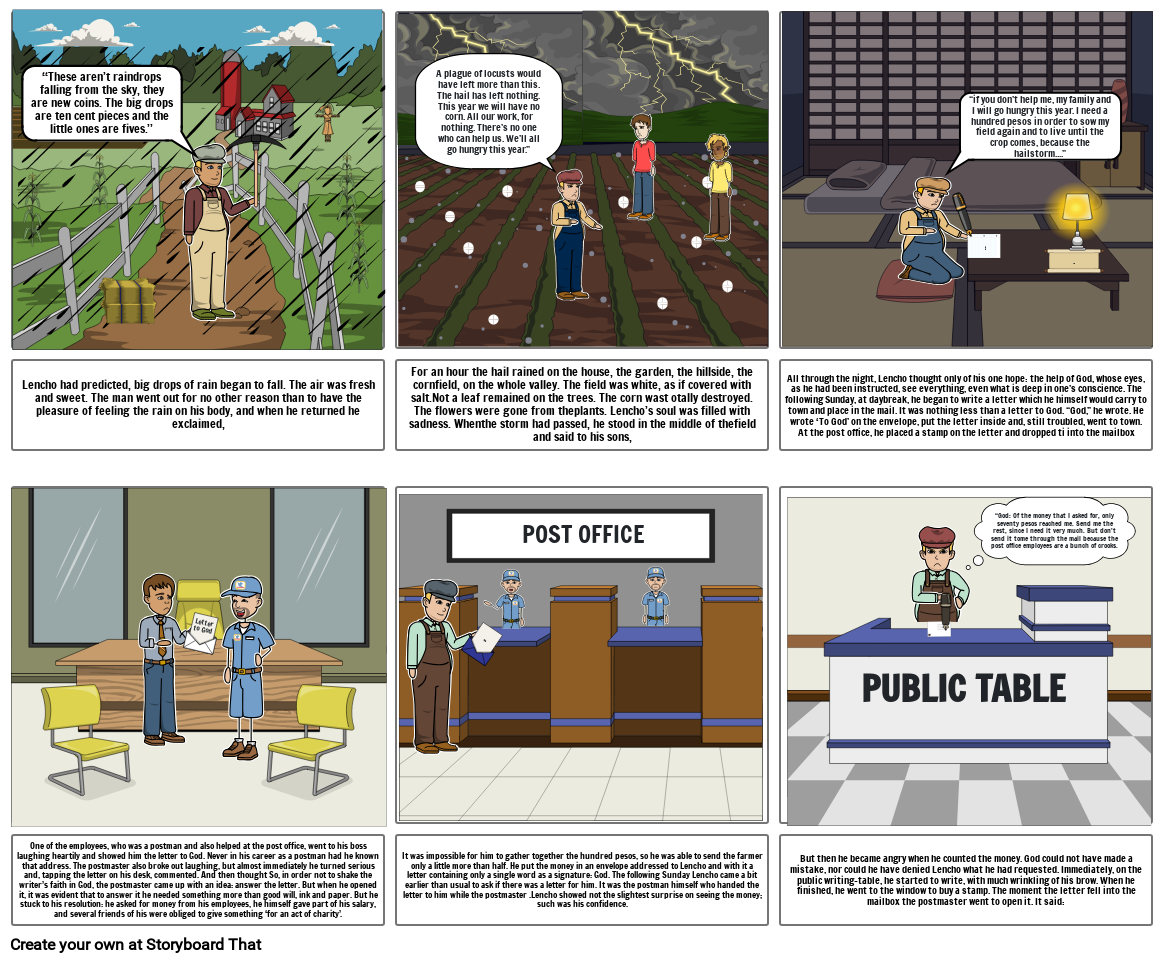A letter to God

Storyboard Szöveg
- Csúszik: 1
- ‘‘These aren’t raindrops falling from the sky, they are new coins. The big drops are ten cent pieces and the little ones are fives.’’
- Lencho had predicted, big drops of rain began to fall. The air was fresh and sweet. The man went out for no other reason than to have the pleasure of feeling the rain on his body, and when he returned he exclaimed,
- Csúszik: 2
- A plague of locusts would have left more than this. The hail has left nothing. This year we will have no corn. All our work, for nothing. There’s no one who can help us. We’ll all go hungry this year.”
- For an hour the hail rained on the house, the garden, the hillside, the cornfield, on the whole valley. The field was white, as if covered with salt.Not a leaf remained on the trees. The corn wast otally destroyed. The flowers were gone from theplants. Lencho’s soul was filled with sadness. Whenthe storm had passed, he stood in the middle of thefield and said to his sons,
- Csúszik: 3
- “if you don’t help me, my family and I will go hungry this year. I need a hundred pesos in order to sow my field again and to live until the crop comes, because the hailstorm....”
- ..
- .
- All through the night, Lencho thought only of his one hope: the help of God, whose eyes, as he had been instructed, see everything, even what is deep in one’s conscience. The following Sunday, at daybreak, he began to write a letter which he himself would carry to town and place in the mail. It was nothing less than a letter to God. “God,” he wrote. He wrote ‘To God’ on the envelope, put the letter inside and, still troubled, went to town. At the post office, he placed a stamp on the letter and dropped ti into the mailbox
- Csúszik: 4
- Letterto God
- One of the employees, who was a postman and also helped at the post office, went to his boss laughing heartily and showed him the letter to God. Never in his career as a postman had he known that address. The postmaster also broke out laughing, but almost immediately he turned serious and, tapping the letter on his desk, commented. And then thought So, in order not to shake the writer’s faith in God, the postmaster came up with an idea: answer the letter. But when he opened it, it was evident that to answer it he needed something more than good will, ink and paper. But he stuck to his resolution: he asked for money from his employees, he himself gave part of his salary, and several friends of his were obliged to give something ‘for an act of charity’.
- Csúszik: 5
- POST OFFICE
- ..
- It was impossible for him to gather together the hundred pesos, so he was able to send the farmer only a little more than half. He put the money in an envelope addressed to Lencho and with it a letter containing only a single word as a signature: God. The following Sunday Lencho came a bit earlier than usual to ask if there was a letter for him. It was the postman himself who handed the letter to him while the postmaster .Lencho showed not the slightest surprise on seeing the money; such was his confidence.
- Csúszik: 6
- “God: Of the money that I asked for, only seventy pesos reached me. Send me the rest, since I need it very much. But don’t send it tome through the mail because the post office employees are a bunch of crooks.
- PUBLIC TABLE
- But then he became angry when he counted the money. God could not have made a mistake, nor could he have denied Lencho what he had requested. Immediately, on the public writing-table, he started to write, with much wrinkling of his brow. When he finished, he went to the window to buy a stamp. The moment the letter fell into the mailbox the postmaster went to open it. It said:
Több mint 30 millió storyboard készült

